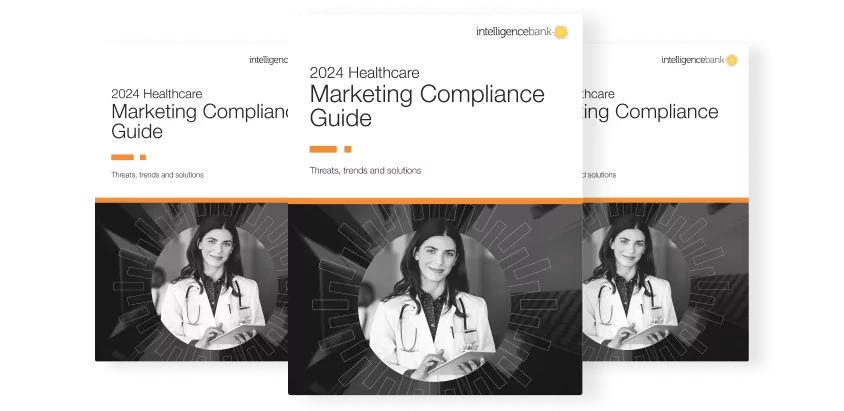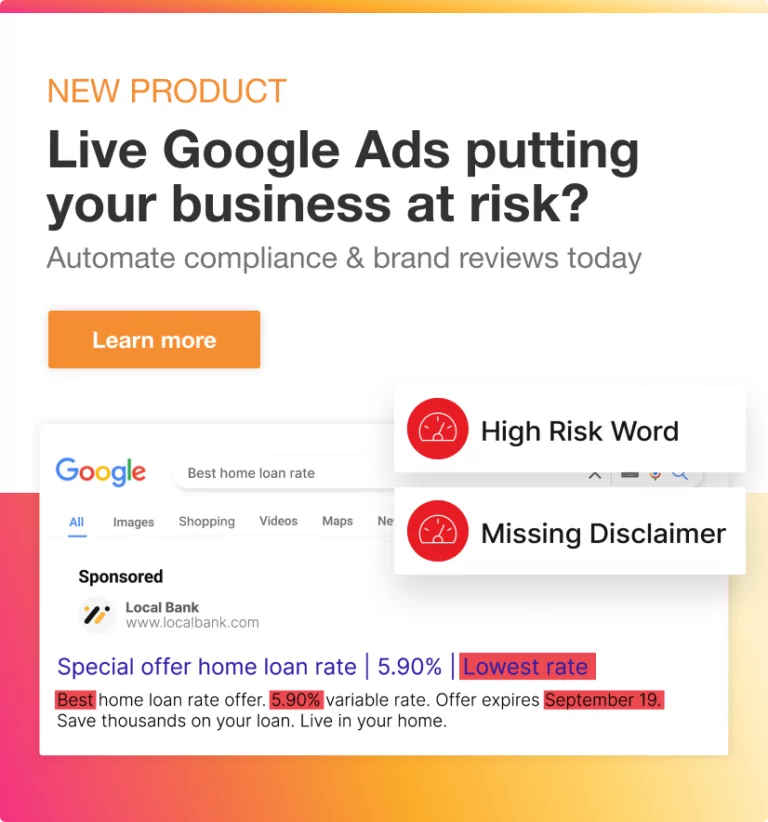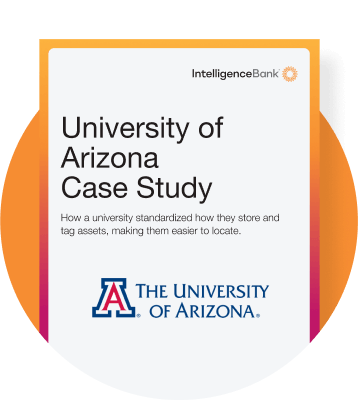Right at the time healthcare marketing compliance has never been under more scrutiny, it also happens that healthcare marketing resources have never been more stretched. Like others in highly regulated industries, healthcare marketers are learning how to do more with less while ensuring they stay within, and abreast of, changing government regulations.
The recent transformations in healthcare marketing regulations have been shaped by technological advancements and shifting consumer behaviors. Compounding this for healthcare marketers is the shift in media buying strategy that has resulted in a significant increase in the volume of creative assets required.
The reason many healthcare marketers are struggling boils down to mathematics: More regulations plus more change plus more content minus additional marketing resources to monitor and execute equals a higher potential for compliance errors.
Dropping the ball and falling foul of healthcare marketing code, even once, can result in eye-watering penalties. Among highly regulated industries, healthcare companies are held to a higher standard than most. Patients and customers are putting their most valuable asset in their organization’s facilities, products and services, so along with regulatory compliance, integrity and trust are non-negotiable.
In light of this, we have published the 2024 Healthcare Marketing Compliance Guide. It’s free to download and will help you understand current and future threats and trends, as well as practical operational solutions for anyone managing healthcare marketing resources.
The Basic Challenges Around Healthcare Marketing Compliance
Unlike many other sectors, healthcare marketing is subject to stringent regulations aimed at protecting consumers, ensuring transparency and upholding ethical standards.
Healthcare marketers are often responsible for promoting products and services that have a direct impact on people’s health and well-being, making it essential they strictly adhere to guidelines to avoid misleading or inaccurate claims. And due to the dynamic nature of healthcare, advances in technology and shifting consumer preferences, healthcare marketing compliance rules are always changing.
While you can read a more detailed review of current trends and threats in our guide, here are some of the primary aspects surrounding healthcare marketing compliance.
Changing consumer behavior
Since the onset of the COVID-19 pandemic, there has been a significant shift in how people choose to manage their healthcare. The rise of telemedicine has reshaped how healthcare is delivered, leading to the widespread adoption of digital healthcare services and a newfound emphasis on preventative self-care.
Consequently, healthcare marketers have pivoted their strategies to promote innovative solutions and products tailored to meet evolving consumer needs. Through targeted marketing campaigns and digital outreach efforts, they are championing ‘out of the box’ services and products aimed at diverse markets.
This, alongside patients’ growing desire to take control of their health, advancements in remote monitoring devices, mobile health apps, and a thriving supplement market have further fueled this transformation. As a result, government regulators are proactively adapting their codes to keep pace with these developments, ensuring that healthcare marketing practices remain compliant and consumer-focused.
Continual change to healthcare marketing compliance codes
Regulatory bodies which include government agencies such as the Food and Drug Administration (FDA) and the Federal Trade Commission (FTC) are responsible for monitoring industry practices, addressing emerging issues, and implementing new regulations to keep pace with evolving trends and technologies.
In our guide, you’ll read about the notable surge in regulatory activity within the healthcare sector. Healthcare marketers face a myriad of compliance challenges across data collection and advertising standards.
Notwithstanding the rules themselves, the primary compliance challenge facing healthcare marketers is staying abreast of regulatory changes and updates. Regulatory bodies are continually revising and refining their guidelines to address emerging issues and adapt to shifting market dynamics. Healthcare marketers must remain vigilant and proactive in monitoring these changes, as failure to comply with updated regulations can result in severe penalties, fines, and damage to reputation.
Normalization of social media and influencer marketing
Social media has established itself as a powerful channel for healthcare marketing, revolutionizing the way organizations connect with patients and disseminate health information. With the widespread adoption of social platforms, healthcare marketers have gained unprecedented access to diverse audiences and demographic groups. These platforms provide an interactive and dynamic environment where healthcare organizations can engage with patients in real time, share valuable insights, and foster meaningful conversations about health-related topics.
The acceptance of influencer marketing has further amplified the impact of social media in healthcare marketing. Influencers, individuals with a significant following and clout on social media platforms, have become key players in shaping consumer behavior and driving engagement. Healthcare marketers are increasingly leveraging influencers to reach specific patient demographics, build trust, and promote health-related products and services. By partnering with influencers who have expertise in specific health niches or conditions, marketers can tap into their existing audience base and leverage their credibility and authenticity to deliver targeted messages. While there are many benefits to this, our guide discusses the threats involved and pitfalls to be aware of.
Healthcare marketing compliance reporting
Government regulatory bodies implement strict monitoring and reporting mechanisms to assess healthcare marketing compliance with standards. Healthcare marketers must develop robust systems for tracking and documenting marketing activities to demonstrate adherence to accreditation guidelines.
Why is Healthcare Marketing Compliance Becoming More Complex?
Our guide explains in detail why it is becoming more challenging to uphold the intricate array of compliance regulations in healthcare marketing. But simply put, the constant state of flux around compliance rules and our need for rapid content creation is exacerbating the situation.
Healthcare marketing compliance rules are ever-changing
- Advancements in medical technology and treatment modalities continually redefine the boundaries of what can be marketed and how it can be promoted.
- Breakthroughs in pharmaceuticals, medical devices, and healthcare services emerge regularly, regulatory bodies must adapt their guidelines to ensure the safety, accuracy, and ethicality of marketing practices.
- Patients are increasingly empowered and informed, seeking more personalized and engaging healthcare experiences. This shift towards patient-centric care results in adjustments to marketing strategies that then prompt regulatory bodies to revise compliance standards.
- Digital channels have revolutionized the way healthcare organizations engage with patients. As these channels continue to evolve, regulatory bodies address new challenges and concerns related to data privacy, advertising transparency, and the promotion of accurate medical information online.
Shifts in healthcare marketing media strategy
Our guide discusses the transformation observed in advertising expenditure and media procurement within the healthcare sector and the consequential effects on the content production timeline. In an era of heightened content consumption, the increased importance of personalized messaging and quick creative turnaround, securing fast legal approval poses a significant challenge.

Failure to Uphold Healthcare Marketing Compliance Rules
Healthcare marketers have an obligation to ethically promote healthcare services and products that benefit the well-being of customers and patients. This is why regulatory bodies maintain a stringent stance against any violations of marketing compliance within the healthcare sector.
Whether you are an established healthcare provider or a new entrant in the market, disregarding or misinterpreting healthcare marketing compliance regulations can lead to severe consequences. Even unintentional errors or technical oversights offer little defence when it comes to breaching healthcare marketing guidelines. Our guide offers real-world examples illustrating the consequences of non-compliance.
Punitive fines and regulatory sanctions may only scratch the surface of the repercussions, as the resulting damage to reputation can prove to be a formidable obstacle to overcome.
How to Control Healthcare Marketing Compliance
Healthcare marketing, like most sectors today, runs at a fast pace. When compliance slows work down, opportunities are missed. Alternatively, cutting corners with content approval increases the probability of errors. Our guide details the costly marketing compliance errors that have severely impacted not just marketing budgets, but entire companies.
The frightening thing is, mistakes can easily happen when your team lacks an efficient, watertight workflow system. With the right system, compliance ceases to be an onerous additional layer of complexity that slows down the process of getting brand and legally approved content out the door.
Our guide outlines more than current trends and real-world tales of severe penalties for stepping outside of marketing compliance law. It provides practical solutions and tools to help healthcare marketers stay compliant, manage marketing resources and meet their objectives.
Preventing financial penalties and safeguarding your reputation by staying abreast of industry trends, engaging in ongoing training, actively communicating with regulatory bodies, collaborating with legal professionals, and implementing compliance software. This approach will enable you to uphold marketing regulations with assurance, fostering trust, strengthening your brand, and positioning yourself as a leader in the industry.
As the oversight and regulation of healthcare marketing compliance advance, the solutions and resources healthcare marketers use to manage them must too.
Emerging from necessity and technological advancement, state-of-the-art marketing compliance workflow tools have surfaced, empowering leaders in healthcare marketing to not just uphold compliance but also significantly improve marketing effectiveness. They play a pivotal role in enabling the healthcare sector to handle the influx of creative content while navigating shifting compliance requirements.
Although marketing operations platforms serve a variety of functions, their primary role is to provide the workflow for briefing, markups and approvals, centralize approved brand assets then make them easily accessible and shareable. Utilizing advanced AI and automation, these platforms streamline the integration of complex legal requirements into various scenarios and seamlessly incorporate them into editable creative templates.
For healthcare marketers, these platforms are crucial as they provide comprehensive audit trails and robust reporting features, ensuring transparency and accountability. This empowers teams to demonstrate compliance to both internal stakeholders and regulatory bodies. Additionally, they facilitate tracking and scheduling of compliance checks for potentially non-compliant or at-risk content.
So, while marketing compliance presents new challenges and complexities, it also brings opportunities for innovation. By using cutting-edge marketing operations software, healthcare marketers can boost efficiency by automating numerous manual tasks. This not only helps streamline compliance processes and mitigate risks but also frees up time for strategic, high-value endeavors. Despite the hurdles, healthcare marketers are increasingly deploying smarter operational systems that ultimately enhance the ROI of their entire organizations.

Achieve Compliance, Build Trust, Drive Growth
Most marketers want to do the right thing and stay within regulatory code. If they are given the resources to achieve that, it saves them from making incorrect assumptions or cutting corners and missing important information.
By using best-in-breed tools, staying informed, proactive, and committed to compliance, healthcare marketers can mitigate risk, build trust with consumers, and uphold the integrity of the healthcare industry.
Gain access to our guide and empower your team to achieve and maintain regulatory compliance effectively. Provide them with resources to create impactful, brand-aligned content that resonates with your audience and best of all, allows for sustainable growth.
Need more information on any of these new features? Contact Us for a demo.





